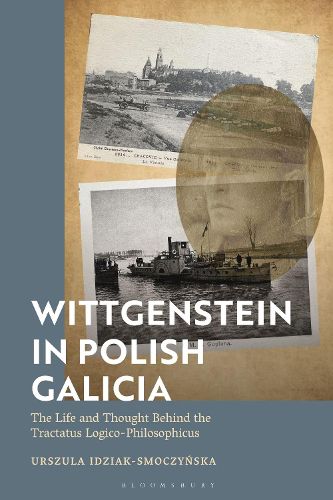Readings Newsletter
Become a Readings Member to make your shopping experience even easier.
Sign in or sign up for free!
You’re not far away from qualifying for FREE standard shipping within Australia
You’ve qualified for FREE standard shipping within Australia
The cart is loading…






A deeply researched account of Wittgenstein's wartime experiences and reading during 1914-1917, revealing numerous previously unknown yet vital details about his work on the Tractatus Logico-Philosophicus.
Delving into Wittgenstein's recently-published in English wartime private diaries, Urszula Idziak-Smoczynska offers unique insight into a pivotal period in Wittgenstein's life, when he completed his ground-breaking work in logic and underwent a profound spiritual transformation that left an indelible mark on his future and his philosophical evolution.
She reconstructs the young Wittgenstein's state of mind as he grappled with the challenges imposed by war. Tracing the roots of Wittgenstein's spiritual sensibilities to works like William James' The Varieties of Religious Experience, Saint Augustine's Confessions, and Nietzsche's writings, Idziak-Smoczynska explores his relationships with key figures of Austrian modernity, including Georg Trakl, Rainer Maria Rilke, L. von Ficker, and Adolf Loos.
As Wittgenstein actively participated in significant offensives on the Eastern Front, including Dankl's offensive, the Brusilov offensive, and the Kerensky offensive of Revolutionary Russia, we enter into a compelling dialogue with the influential literary and philosophical works that shaped his thinking in such close proximity to the battlefield: the Bible, novels by Keller, Tolstoy, and Dostoevsky.
This important exploration of Wittgenstein's formative years is essential reading, shedding light on Wittgenstein's philosophical journey and highlighting his role in a broader context-as one of the major intellectuals and artists who struggled in the First World War and went on to shape the postwar scientific and artistic landscape
$9.00 standard shipping within Australia
FREE standard shipping within Australia for orders over $100.00
Express & International shipping calculated at checkout
A deeply researched account of Wittgenstein's wartime experiences and reading during 1914-1917, revealing numerous previously unknown yet vital details about his work on the Tractatus Logico-Philosophicus.
Delving into Wittgenstein's recently-published in English wartime private diaries, Urszula Idziak-Smoczynska offers unique insight into a pivotal period in Wittgenstein's life, when he completed his ground-breaking work in logic and underwent a profound spiritual transformation that left an indelible mark on his future and his philosophical evolution.
She reconstructs the young Wittgenstein's state of mind as he grappled with the challenges imposed by war. Tracing the roots of Wittgenstein's spiritual sensibilities to works like William James' The Varieties of Religious Experience, Saint Augustine's Confessions, and Nietzsche's writings, Idziak-Smoczynska explores his relationships with key figures of Austrian modernity, including Georg Trakl, Rainer Maria Rilke, L. von Ficker, and Adolf Loos.
As Wittgenstein actively participated in significant offensives on the Eastern Front, including Dankl's offensive, the Brusilov offensive, and the Kerensky offensive of Revolutionary Russia, we enter into a compelling dialogue with the influential literary and philosophical works that shaped his thinking in such close proximity to the battlefield: the Bible, novels by Keller, Tolstoy, and Dostoevsky.
This important exploration of Wittgenstein's formative years is essential reading, shedding light on Wittgenstein's philosophical journey and highlighting his role in a broader context-as one of the major intellectuals and artists who struggled in the First World War and went on to shape the postwar scientific and artistic landscape